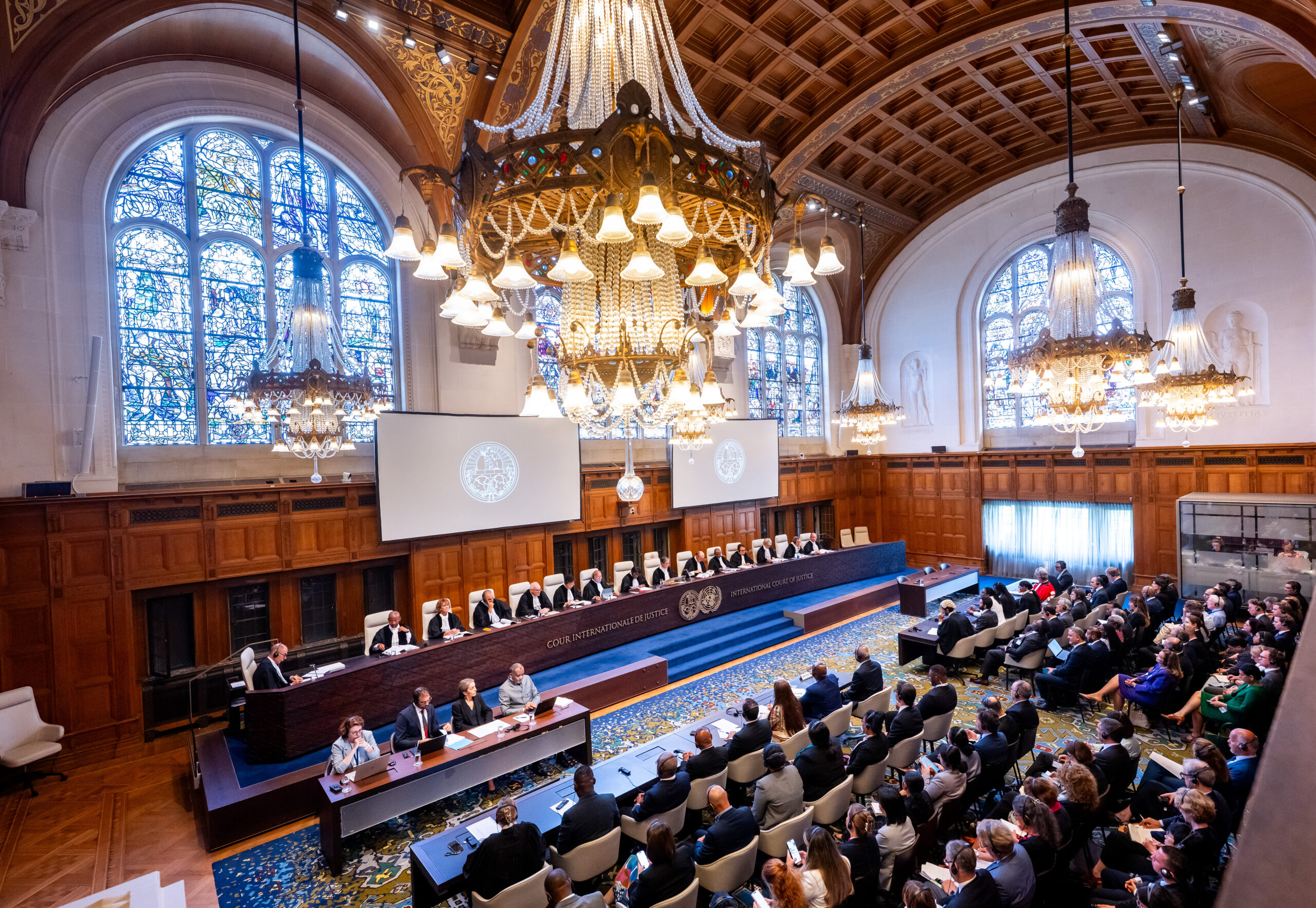Call for Papers
We are glad to launch a new call for papers to highlight new perspectives on Green Rights in international environment law. Contributions should take the form of short articles (1000-2000 words). Articles can be submitted as long as this call for papers is online on the Green Diplomacy Blog’s website. Upon acceptance, their publication will be planned according to the blog's program and priorities.
The role of international courts and international institutions in promoting and advancing environmental rights

1. ABOUT THE BLOG
Green Diplomacy is a blog by jurists for diplomats. It aims to provide diplomats dealing with climate negotiations with actionable proposals in the form of short articles. Its scope covers international environmental law and governance, and it focuses on publishing action-oriented pieces, as its purpose is to feed ongoing discussions with legal proposals, targeting an audience primarily composed of significant diplomats as well as other relevant stakeholders such as NGOs, business representatives, and state actors.
Its Advisory Board is chaired by former COP 21 President Laurent Fabius and comprises eminent jurists and experts such as Antonio Benjamin, Samantha Besson, David R. Boyd, Dan Esty, Sandrine Maljean-Dubois, Makane Mbengue, Nilüfer Oral, Nicholas Robinson, Jeffrey Sachs, Jorge E. Viñuales, and Christina Voigt. The Blog includes many Partners including the IUCN World Commission on Environmental Law (IUCN-WCEL), the International Council on Environmental Law (ICEL), the European Environmental Bureau (EEB), the Common Home of Humanity, and the Club des Juristes.
2. TOPIC
Introduction
Multilateralism is essential in addressing global environmental challenges pertaining to the triple planetary crisis of climate change, pollution, and biodiversity loss, which transcend national boundaries and demand international cooperation. This call for papers invites contributions exploring the pivotal role that international institutions, multilateral agreements and international courts play in promoting and advancing environmental rights.
In recent decades, civil society and legal scholars have increasingly called for the recognition of a new generation of human rights: environmental rights. Such a rights-based approach provides critical solutions for people impacted by global environmental challenges. Precisely, international agreements and resolutions are essential for promoting these rights. For instance, in 2021, the UN Human Rights Council recognised the right to a clean, healthy and sustainable environment as a human right in Resolution 48/13, a landmark momentum which was followed by the UN General Assembly Resolution 76/300 on the human right to a in July 2022. More recently, the Pact for the Future, adopted during the 2024 Summit of the Future, emphasised the importance of recognising the rights of younger generations.
Moreover, the growing involvement of various actors, including courts and international organisations, is also crucial in the promotion and expansion of third-generation rights.
With regards to international courts, recent developments underscore the judiciary’s increasingly prominent role in clarifying state obligations with respect to climate change and environmental rights. The International Tribunal for the Law of the Sea (ITLOS) opened this new cycle of advisory opinions (AOs), affirming that states are legally obliged under the law of the sea to prevent, reduce, and control marine pollution caused by greenhouse gas emissions. Colombia and Chile submitted a request to the Inter-American Court of Human Rights (IACtHR) for an advisory opinion to clarify state obligations, both individual and collective, in response to the climate emergency, highlighting the disproportionate impacts of climate change on vulnerable populations, regions, and ecosystems. Most recently, the International Court of Justice (ICJ) issued its landmark advisory opinion recognizing climate action as a human rights obligation, thereby underscoring that states must take concrete measures to protect both present and future generations from the adverse effects of climate change. In this evolving jurisprudence, observers now refer to a sequence of advisory opinions, with the emerging triptych of ITLOS, IACtHR, and ICJ decisions marking a chronological and substantive progression. Similarly, the European Court of Human Rights addressed, this year, the landmark case Verein KlimaSeniorinnen Schweiz v. Switzerland. On that occasion, the Grand Chamber ruled that Switzerland must take concrete steps to protect its citizens from the adverse impacts of climate change, ensuring they can enjoy their fundamental human rights.
With regards to international organisations, these institutions have been a forum to debate and progress on environmental rights. On an international scale, the International Union for Conservation of Nature (IUCN) World Congress on Environmental Law has established, in 2016, the goal of building the environmental rule of law as the legal foundation for environmental justice. United Nations Special Rapporteurs have also played a key role in advancing environmental rights, notably through thematic reports that clarify the content of the right to a healthy environment and its interlinkages with other human rights, as well as through country visits and communications with States on alleged environmental harms. Regional agencies have also been particularly active on this front. During the 4th Reykjavik Summit of the Council of Europe in May 2023, Member States committed to strengthening their work at the Council of Europe on the human rights aspects of the environment. The Parliamentary Assembly of the Council of Europe also adopted a resolution stressing the urgency of a legally binding instrument recognising an autonomous right to a healthy environment within the Council of Europe. The European Union has also shown initiative by adopting the 2024/1203 directive on the protection of the environment through criminal law, taking human health into account for the assessment of crimes.
Call for Contributions
In the light of these significant developments, the editorial board is pleased to invite contributions exploring the role of international institutions and multilateral agreements in promoting and advancing environmental rights. Submissions may address, but are not limited to, the following topics:
- The role of international and regional courts in developing and protecting environmental rights.
- The significance of recent judicial interventions in the context of the climate crisis.
- The environmental and human rights implication of the Advisory Opinion of the International Court of Justice
- Advisory proceedings and their role in clarifying state obligations amidst the climate crisis.
- The rise of climate litigation and its effect on legal precedents for environmental rights.
- Multilateral agreements and their role in advancing environmental rights and addressing global environmental challenges such as climate change, pollution, and biodiversity loss.
- International legal pathways for recognising the rights of future generations in the context of climate change
- The impact of the European Court of Human Rights ruling in Verein KlimaSeniorinnen Schweiz v. Switzerland, namely on the recognition of a human right to a healthy environment within the Council of Europe.
- Comparative legal analysis of national, regional, and international legal frameworks for environmental rights and the rights of future generations in the context of climate change.
- Innovative approaches to environmental multilateralism for the protection of environmental rights: emerging initiatives, strategies and partnerships.
- Consideration of environmental rights by United Nations’ institutions.
- Consideration of environmental rights by international environmental institutions and bodies (UNFCCC and CBD Executive Secretariats, etc.).
- Consideration of environmental rights by international organisations in the economic sphere (World Bank, IMF, WTO, etc.)
- Consideration of environmental rights by regional organisations (Council of Europe, European Union, Organisation of American States, African Union, etc.)
3. GUIDELINES FOR SUBMISSIONS
Content
- Actionable content: the content of the contributions is expected to be concrete, precise, and directly related to the potential recognition of environmental rights by international bodies. Green Diplomacy is an action-oriented blog.
- Intelligible style: publications are expected to be intelligible by diplomats, with a self-contained writing style that is sufficiently comprehensible by jurists and non-jurists alike.
- Key Proposals: in addition to the text of the article itself, submissions should be complemented by a short text summarising the contribution’s key proposals in two or three bullet points.
- Language: the language of publication is English.
Format
- Length: the length of a contribution should be between 1000 and 2000 words, inclusive of any references.
- Footnotes: footnotes may be used on the Blog. However, it is preferable that all references be included through hyperlinks. No distinction is made between endnotes and footnotes.
- Headings: if the contribution has subdivisions, they should be numbered 1.1 (then 1.1.1, 1.1.2, …), 1.2, etc. The introduction is not included in section numbering. Headings should be in bold.
- Citations: citations and references should be put in parentheses immediately after the propositions or quotations that they support.
Submission
- Author profile: if this is your first time contributing to Green Diplomacy, and if you’re not a contributor to the former Pathway to the 2022 Declaration blog, we will create your author profile. Please submit a short biography ranging from 100 to 200 words in the description section and, if applicable, a hyperlink to your professional web page and details of any LinkedIn or Twitter profile you may have. Please also attach a color photo of yourself in the form. You may additionally send any other photographs that are relevant to the content of your post.
- Keywords: a short list of keywords must also be included to ensure proper referencing of the article.
- Revisions: contributors can expect to be asked to revise their contributions and publication is never guaranteed.
Calendar:
- Deadline: posts should be submitted preferably prior to January 1, 2026. However, posts submitted afterwards will still be considered.
- How to submit: Posts should be submitted by email at editorial@greendiplomacy.org.
- Publication: articles will be published throughout the duration of the call for papers.
- Contact: for any further information, contact us on papers@greendiplomacy.org.

